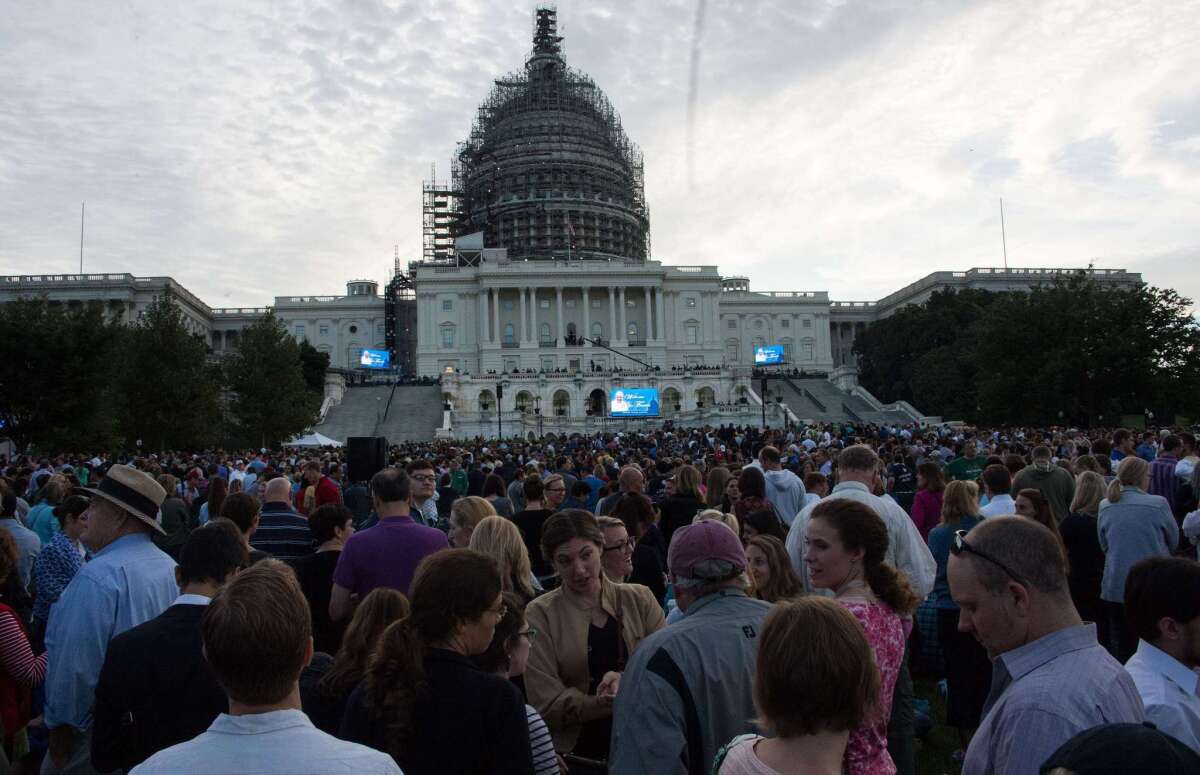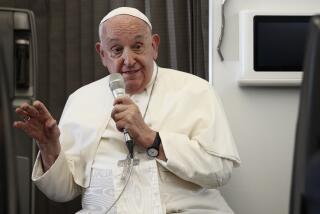Pope Francis tells Congress it should use its power for ‘restoring hope, righting wrongs’

People gather in front of the Capitol in Washington before Pope Francis addresses a joint meeting of Congress.
Reporting from Washington — In a historic speech to Congress that served as the centerpiece of his trip to the capital, Pope Francis added a powerful — and mostly liberal — voice to issues that dominate American debate, particularly immigration and global warming.
The pope urged Congress to put aside division and draw on the nation’s rich history to pursue “the common good.” He framed that bipartisan goal, however, by setting policy goals that largely confirmed the worries that some conservatives had expressed in advance of his visit.
And he vividly illustrated one of his concerns — the plight of the poor — by leaving the Capitol after he called on lawmakers to act and traveling a few blocks to a downtown Washington church. There, less than an hour after he had mingled with the nation’s most powerful leaders Thursday, Francis blessed the homeless as they ate a meal provided by a Catholic charity.
The pope’s address before a joint meeting of Congress, the first for a leader of the Roman Catholic Church, momentarily disrupted the divisions entrenched in American politics.
Lawmakers from both parties listened — some at the edge of their seats, others jumping to applause, a few wiping away tears — as the 78-year-old pontiff admonished them to use their political strength for “restoring hope, righting wrongs.”
Outside the Capitol, thousands gathered to watch the address on Jumbotrons set up on the West Lawn. Some chanted “U.S.A.” and sang “God Bless America.”
Later in the morning, Francis appeared briefly on the Speaker’s Balcony to greet the crowd — “Buenos dias,” he declared — before visiting with the homeless and others in need at St. Patrick’s Church in downtown Washington.
There, he spoke about homelessness to 200 clients of Catholic Charities — the unemployed, those in need of medical help, and immigrants seeking aid. He then stepped outside to talk with about 300 homeless men, women and children having meals, blessing the food as they ate.
Francis had been invited to address Congress by Republican House Speaker John A. Boehner of Ohio, who dabbed away tears throughout the day, including during a private meeting with the pope before the speech.
During that session, the Vatican interpreter told him that Francis had said Boehner’s green tie was “the color of hope.”
“I need a lot of hope today,” responded the often-beleaguered speaker.
The pope was the object of bipartisan applause when he arrived, and he said he hoped to reach the entire country with his words.
“You are called to defend and preserve the dignity of your fellow citizens in the tireless and demanding pursuit of the common good, for this is the chief aim of all politics,” the pope told the lawmakers, some of whom seemed to strain to make out his words, spoken at times almost in a whisper and in a language, English, that is not his own.
“Politics,” he said, is “an expression of our compelling need to live as one, in order to build as one the greatest common good: that of a community which sacrifices particular interests in order to share, in justice and peace, its goods, its interests, its social life.”
But as his speech moved from general exhortations to specifics, the pattern of applause in the House chamber made clear that papal calls to abolish the death penalty, welcome immigrants, combat climate change and work against income inequality were more welcome on the Democratic side than among Republicans.
A section of the speech in which Francis cited the Bible’s golden rule — “Do unto others as you would have them do unto you” — as he discussed immigration illustrated how he sought to mix his appeals, but also the overall impact.
“We need to avoid a common temptation nowadays: to discard whatever proves troublesome,” he said. The golden rule “points us in a clear direction,” he added. “Let us treat others with the same passion and compassion with which we want to be treated. Let us seek for others the same possibilities which we seek for ourselves.
“The yardstick we use for others will be the yardstick which time will use for us.”
That drew lawmakers to their feet, largely from the Democratic side of the aisle.
Francis immediately followed, however, by applying the same lesson to abortion, although he did not mention the procedure directly.
“The golden rule also reminds us of our responsibility to protect and defend human life at every stage of its development,” he said as Republicans led the applause.
No sooner had their cheers begun to abate than the pope spoke of another aspect of what the Roman Catholic Church — but not American politics — sees as a seamless continuum.
“This conviction has led me, from the beginning of my ministry, to advocate at different levels for the global abolition of the death penalty,” he said. “A just and necessary punishment must never exclude the dimension of hope and the goal of rehabilitation.”
Although the pope raised several other topics — including global warming, against which he urged “courageous actions and strategies,” and the global trade in weapons — immigration was the central element of the address.
Francis, whose family immigrated from Italy to Argentina, challenged Congress to act with compassion in dealing with migrants, not only refugees in Europe, but also those fleeing north from Mexico.
“When the stranger in our midst appeals to us, we must not repeat the sins and the errors of the past,” he said.
“Thousands of persons are led to travel north in search of a better life for themselves and for their loved ones, in search of greater opportunities. Is this not what we want for our own children? We must not be taken aback by their numbers, but rather view them as persons, seeing their faces and listening to their stories.”
Francis, who had never before visited the United States, called himself “a son of the continent,” and invoked historical lessons from four American figures — Abraham Lincoln, the Rev. Martin Luther King Jr. and two U.S. Catholic leaders, the Cistercian monk Thomas Merton and the labor activist Dorothy Day.
He admonished Congress to use the nation’s civic traditions as a spur to action. “A good political leader is one who, with the interests of all in mind, seizes the moment in a spirit of openness and pragmatism,” he said.
Those ideas drew praise from people in the audience outside.
Jonathan Soo Hoo, 23, from Mill Valley, Calif., a master’s student at George Washington University Law School, spoke of the pope as “a tremendous leader on issues relating to faith” who “serves as a beacon for morality and spirituality that should inspire everyone.”
“We can all learn something from listening and internalizing the lessons he speaks of from the holy book,” Soo Hoo said.
Jose Cabrales, 37, of Watsonville, Calif., arrived at the Capitol at 3:30 a.m. along with a friend’s parents, who had traveled from Anaheim.
“I came today because the pope’s message of justice and peace resonates with me, as well as his Jesuit values — competence, conscience and compassion,” he said.
Inside the building, however, there was little indication that Washington’s warring factions had heeded the pope’s exhortation to unity.
“I welcome the pope’s call to put aside petty bickering and come together behind shared values,” said Sen. Ted Cruz (R-Texas), a presidential candidate who portrays himself a disruptive force in politics and is threatening a government shutdown. “What I have endeavored to do is speak the truth with a smile.”
As Francis headed for New York, lawmakers were back to work in the afternoon, voting in the Senate on a measure to keep the government running past next Wednesday’s deadline. It failed.
michael.memoli @latimes.com
Times staff writers Marcus Howard in Washington and Michael Muskal in Los Angeles contributed to this report.
More to Read
Sign up for Essential California
The most important California stories and recommendations in your inbox every morning.
You may occasionally receive promotional content from the Los Angeles Times.












